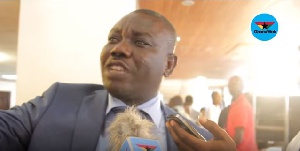The announcement of the 50 per cent reduction in the benchmark value of imports, as well as the 30 per cent reduction on import duties on cars by Vice President Dr Mahamudu Bawumia, will haunt the New Patriotic Party (NPP) in the 2020 elections, Isaac Adongo, Member of Parliament for Bolga Central, has said.
According to Mr Adongo, the announcement by the second gentleman of the land is to hoodwink Ghanaians to believe that the government was interested in the welfare of importers.
Mr Adongo speaking during the NDC’s Public Lecture on the Ghanaian Economy, an event attended by stalwarts of the party including former President John Dramani Mahama in Accra on Thursday, 4 April 2019 said: “Your Excellency, while the people of Ghana were jubilating yesterday especially our brothers and sisters who are into import to distributive trade, I reminiscent the days of the first budget of the NPP in 2017 when the people of Abbosey Okai were jubilating over the scrapping of import duties.
“I said to myself yesterday that this is the second deceit that will hang the NPP forever in 2020.”
Vice-President Dr Mahamudu Bawumia on Wednesday April 3 announced that the benchmark value of imports has been reduced by 50 per cent.
Import duties on cars have also been cut by 30 per cent.
Dr Bawumia, said these reforms are part of measures to deal with smuggling at the various entry points into the country as well as assist businesses in Ghana.
“To reduce the incidence of smuggling and enhance revenue, the benchmark delivery value of imports will be reduced by 50 per cent,” Dr Bawumia said at a town hall meeting in Accra.
President Nana Addo Dankwa Akufo-Addo last week indicated that reforms to Ghana’s import duty regime, which are expected to bring down the high duties prevailing at Ghana’s ports, were in the offing, and would be rolled out soon.
With some business groups having petitioned the state to intervene and review the high taxes and duties on imported items, Nana Akufo-Addo assured the business community that the government is already in the process of dealing with the matter.
“We have realised from the studies we have done that our ports are not competitive, and the import regime in our country is far too high. We are dealing with it, and, very soon, the measures that the government will roll out will become known to all of you. I am not talking next year, or in 6 months’ time, I am talking very, very soon,” he said.
Nana Akufo-Addo made this known on Saturday, 30 March 2019, when he addressed a town hall meeting of Ghanaians resident in Worcester, Massachusetts, in the United States of America, as part of his visit to that country.
Indeed, some trader unions, including the Ghana Union of Traders Associations (GUTA), have petitioned the state to intervene and review the high taxes and duties on imported items.
Paperless reduces port charges
Already, the introduction of the paperless port system has, according to the Minister of Finance, Mr Ken Ofori-Atta, reduced the cost of doing business at the ports.
Appearing before parliament to answer a question posed by MP for the Adaklu constituency, Mr Kwame Agbodza, on whether or not the introduction of the paperless port has increased the cost of doing business at the ports, the minister indicated that the initiative has rather decreased the cost of doing business.
“The results (of the Paperless Port system) showed that the cost components of doing business at the country’s ports have reduced from 7 to 3 cost components. This has, subsequently, reduced the total costs from GHS1,280 to GHS320,” Mr Ofori-Atta said.
He continued, “This means that the paperless system reduced the cost of doing business at the ports by GHS960 representing 75 per cent savings. Hence, importers are now making savings of 75 per cent as a result of the implementation of the paperless system.”
General News of Thursday, 4 April 2019
Source: classfmonline.com













